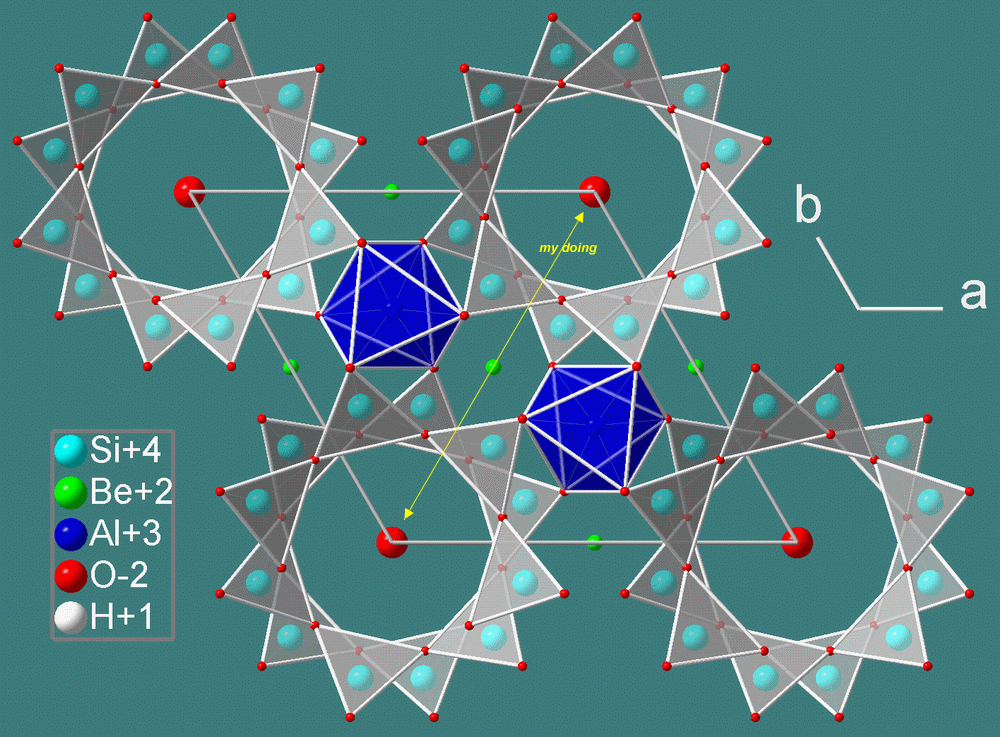
Image Source: http://www.dalamatiacity.com
The above diagram shows the atomic structure inside the crystal gemstone “Beryl”, which is composed of Silicon, Aluminium, Beryllium, and Oxygen ions.
Topaz, Olivine, Amethyst, and several other crystals found in nature also have triangular atomic structures.
The triangle is a natural shape which gives great strength to any structure.
Nature uses Triangles to make strong solid materials, which due to their internal geometry can be cut into beautiful gem stones.
Humans use Triangles to create strength in structures such as High Voltage Electricity Towers, structural frames for building and bridges, and even on farm gates.

Image Source: http://www.nationalgrid.com
Types of Triangles
A triangle is a geometrical shape made up of 3 points called “Vertices” which are connected together by lines called “Segments”.
Eg. A triangle has three sides and is made of straight lines.
A triangle may be classified by how many of its sides are of equal length.
It can also be classified by what types of angles it has.
The vertices are labelled using upper case capital letters like A B and C, or D, E, and F, or P, Q, and R and so on.
The Angles inside the triangle which correspond to these Vertex points are labelled using lower case letters such as a,b,c or d,e,f and so on.
The line segments are labelled according to the vertex points that they connect to, such as AB, BC, or AC. Note that we keep the letters in alphabetical order, and also write lines above them to indicate that they refer to the linear sides of the triangle.
This is summarised in the following diagram.

Image Copyright 2012 by Passy’s World
There are four main types of Triangles that we use in the mathematics of geometry.
These are called “Equilateral”, “Isosceles”, “Scalene”, and “Right Angled” triangles.
The properties of these four types of triangles are shown in the following diagrams.

Image Copyright 2012 by Passy’s World
Triangles are also referred to as being either “Acute”, “Obtuse”, or “Right” Triangles.
“Acute” triangles have all three of their angles less than 90 degrees in size, such as the Equilateral and Isosceles triangles shown ablove.
“Obtuse” triangles contain one angle which is larger than 90 degrees, like the Scalene triangle shown above.
A “Right” Triangle that contains one L-shaped 90 degree angle is neither Acute or Obtuse. It is exactly inbetween these two, and is given the special name of “Right Triangle”.
This is summarised in the following diagram.

Image Source: http://mrferrell.pbworks.com
Videos About Classifying Triangles
The following video explains how to classify triangles as Acute, Obtuse, or Right.
This next video is about Equilateral, Isosceles, and Scalene triangles.
Here is a great rocking music clip all about triangles.
Note that the word “Congruent” means “Identical” or “Equal”.
Classifying Triangles Worksheets
There are a number of different PDF worksheets, with answers available for free at the following links:
http://www.mathworksheets4kids.com/triangles.html
http://www.k6-geometric-shapes.com/triangle-worksheet.html
http://www.helpingwithmath.com/printables/worksheets/geo0701triangles01.htm
Classifying Triangles Games
This first game involves getting Baseball hits everytime you classify a given triangle correctly.
Make sure you click on the right hand corner question mark to hear the instructions about how to swing at the ball.
Click the following link to play this fun game.
http://www.factmonster.com/math/knowledgebox/player.html?movie=sfw41507
In the above game we use the mouse to grab the triangles as they pass by, and place them into the correct basket.
Click the following link to play this game.
http://www.math-play.com/classifying-triangles/classifying-triangles.html
This next game from BBC Mathematics is similar to the previous game, except that it focusses on Equilateral, Isosceles, and Scalene triangles, as well as some common four sided figures called “Quadrilaterals”.
Click the following link to play this game.
http://www.bbc.co.uk/bitesize/ks2/maths/shape_space/shapes/play/
Related Items
Geometry Interactives at Geogebra
Interactives at Math Warehouse
Jobs that use Geometry
If you enjoyed this post, why not get a free subscription to our website.
You can then receive notifications of new pages directly to your email address.
Go to the subscribe area on the right hand sidebar, fill in your email address and then click the “Subscribe” button.
To find out exactly how free subscription works, click the following link:
If you would like to submit an idea for an article, or be a guest writer on our blog, then please email us at the hotmail address shown in the right hand side bar of this page.
Feel free to link to any of our Lessons, share them on social networking sites, or use them on Learning Management Systems in Schools.
Enjoy,
Passy






Pingback: Angle Sum in a Triangle | Passy's World of Mathematics
Pingback: Exterior Angle of a Triangle | Passy's World of Mathematics
Pingback: Angles and Parallel Lines | Passy's World of Mathematics
Pingback: Isometric Drawing and 3D Cubes | Passy's World of Mathematics
Pingback: Links, Links, Links, and More Links to MATH | butlermathmania
Pingback: Congruent Triangles | Passy's World of Mathematics
Pingback: Flipped Lesson: Triangles | Miss Posey
Pingback: Similar Triangles | Passy's World of Mathematics
Pingback: Geometry in the Animal Kingdom | Passy's World of Mathematics
Pingback: Jobs With Geometry | Passy's World of Mathematics
Pingback: Trigonometry – Labeling Triangles | Passy's World of Mathematics
Pingback: Trigonometric Ratios | Passy's World of Mathematics
Pingback: Links, Links, Links, and More Links to MATH | butlermathmania
Pingback: The Tangent Ratio | Passy's World of Mathematics
Pingback: The Cosine Ratio | Passy's World of Mathematics
Pingback: The Sine Ratio | Passy's World of Mathematics